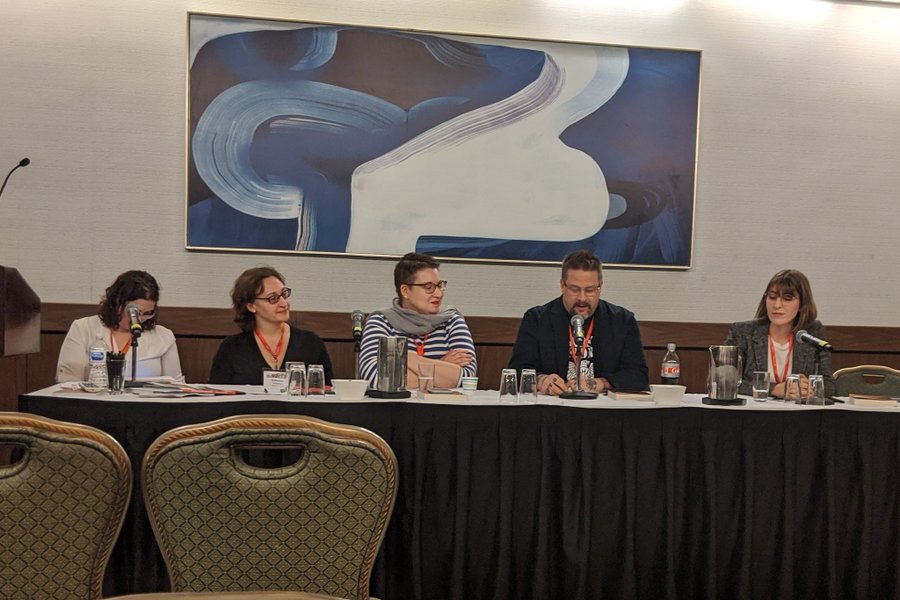Teaching History Writing II
While I can’t offer a minute-by-minute account of what was said in our panel on teaching students to write history at #AHA20 on Monday, I can offer my take away moments – my ‘What I Learned From My Co-Panelists,” perspective. And I learned a tremendous amount.

Let me start with Carolyn Levy of Penn State. Carolyn is a graduate student, and spoke pointedly (and poignantly) to the circular lack of writing instruction in higher ed. Most people who’ve entered the professoriate were not taught to teach writing, which means they rarely teach writing in their classes. When those classes are large lecture classes with TA-led discussion sections, therefore, the burden of teaching writing falls on those TAs. They, themselves, have received no instruction on teaching writing, but they have to grade the written assessments students produce. Many grad students, Carolyn argues, therefore have to learn how to teach writing on their own, and work it into sections where professors are expecting them to reach other goals.
This is, of course, manifestly unfair. It puts the burden of teaching writing on the most junior members of the profession, and expects that they – and undergraduate students – will intuit their way through this situation. It’s an experience often shared by contingent faculty, too, who are equally likely not to have received instruction in teaching writing, and who are also on the frontlines of teaching undergraduate students taking intro-level history.
We need to do better by everyone – and to recognize, as Kate Antonova noted in her comments, that those of us in the profession probably found it easier than most students to figure out the mechanics of history writing. It came easily to us; we did intuit things. But that is not the case for most undergraduates, and it’s a dereliction of duty not to address it.
Kate was not initially taught how to teach writing in graduate school, either – not until she sought out instruction in comp studies, and began learning from experts in that field. She’s been working at this problem for twenty years now, culminating in her new book (out as of today!) The Essential Guide to Writing History Essays from Oxford University Press. Kate points out that there’s not just one kind of writing needed in history – there are genres of writing, whether it’s a short-answer essay in a blue-book exam, or a long, primary-source research paper in an upper-level seminar, and everything in between. Her book sets out to do what she did at the panel – to demystify the conventions of disciplinary writing, and to give students clear guidelines for how to succeed in history.
My big take-away from Kevin Gannon’s commentary was that teaching writing is about social justice. Teaching writing is not simply a matter of doing due diligence by our professional standards – it’s about ensuring that every student in our classes has the tools they need to succeed. We cannot trust that students have learned these skills in high school (and not because HS teachers are bad!) and if we don’t teach them in our classes, we will replicate the disparate learning inequities embedded in our education systems. Kevin also reminded us all that line editing a paper is not teaching writing. Having a laser focus on grammar is not teaching writing. Teaching writing is a much bigger, more important, and messier enterprise than that. At its foundation, writing should be about stressing what students are doing right, instilling them with confidence that they belong in our classrooms and can continue to learn and grow, and helping them see the big picture of how writing can help them with that goal.
(I wrote up my own comments [here]!)
Lastly, I want to articulate my enormous appreciation for Jennifer Foray’s turn as our chair. Not everyone knows how to chair (another thing we’re often not taught in graduate school), and Jennifer offered a master class. She facilitated conversation between the panelists over email before we met in person; she offered those in attendance at our session a clear agenda for what would take place; she made sure high school teachers knew they could get (and how to get) continuing education credit for being there; she introduced everyone clearly; she circulated around the room with a microphone so that everyone could hear questions from the audience; and she kept a meticulous eye on time. She was amazing.
I’ve linked to everyone’s twitter profile from this summary, so if you have questions about any of the panelist’s comments, please feel free to head over and ask them a question! I know that everyone on the panel is deeply committed to making sure our students succeed at writing history, and would love to hear from you.